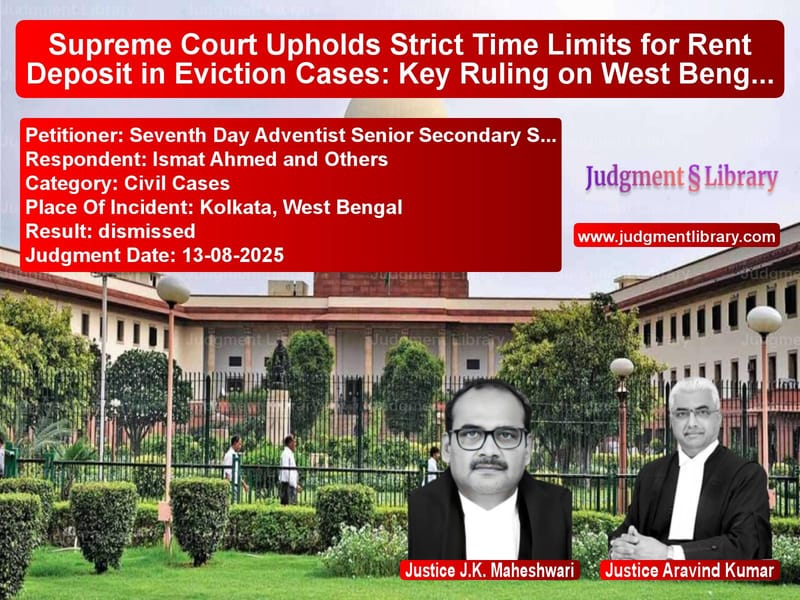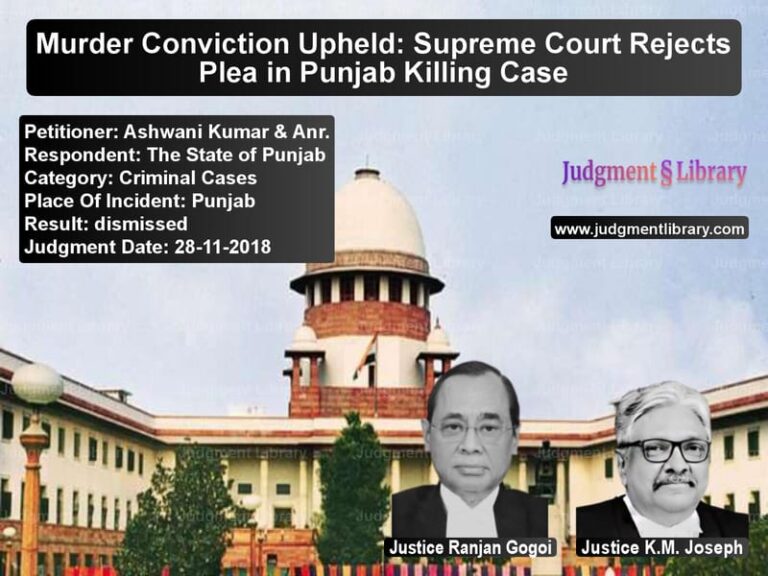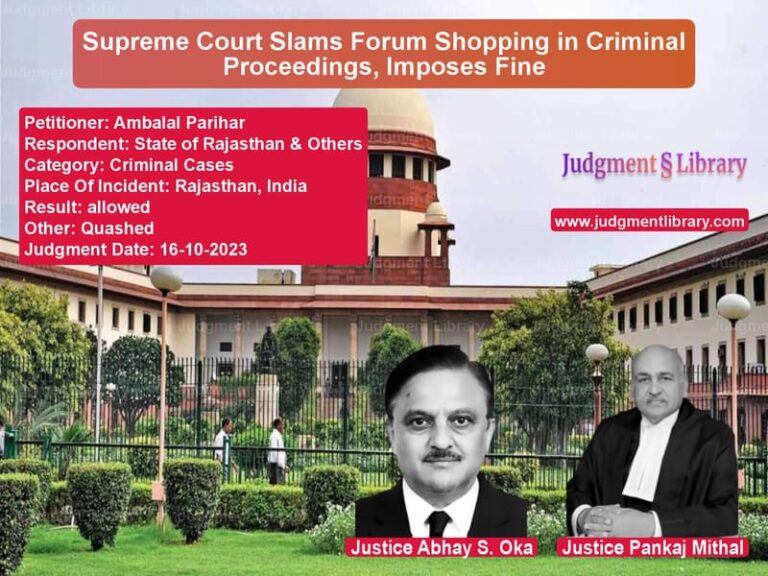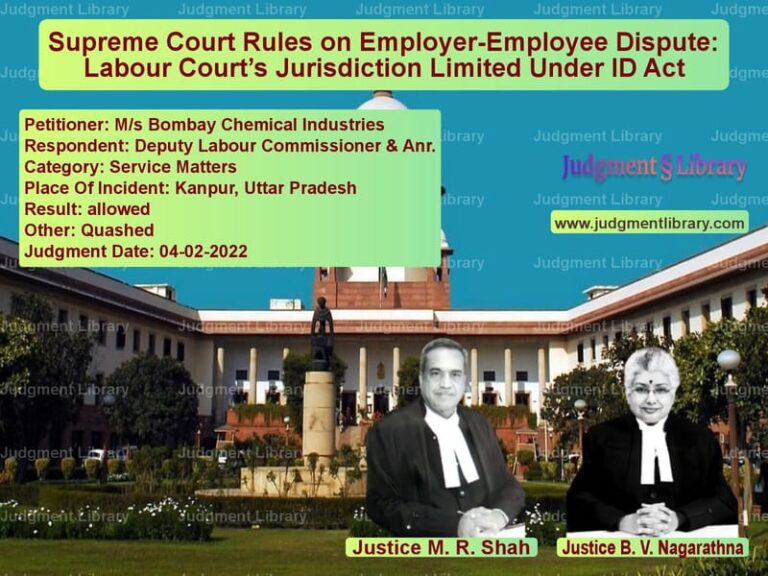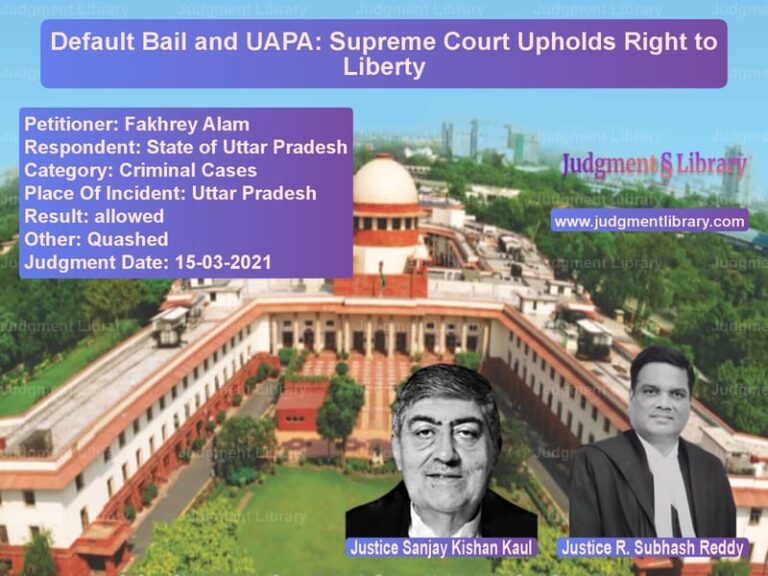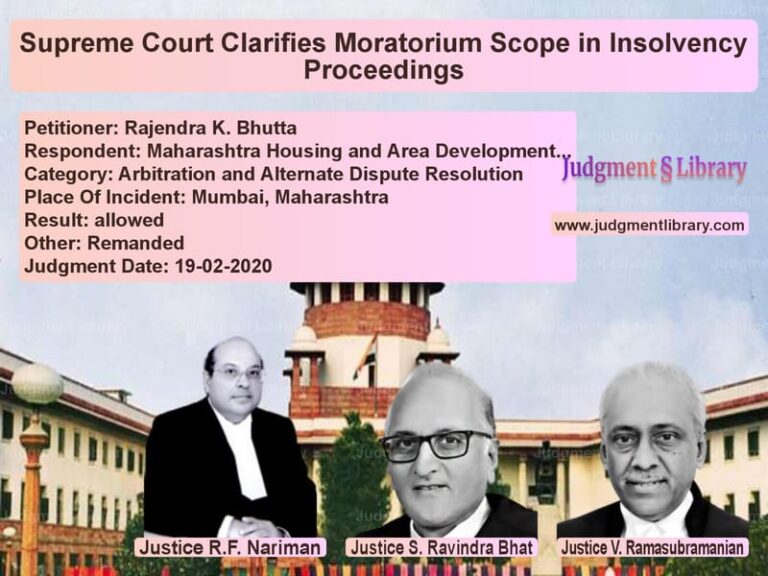Supreme Court Upholds Strict Time Limits for Rent Deposit in Eviction Cases: Key Ruling on West Bengal Tenancy Law
In a landmark judgment that clarifies the strict timelines governing tenant protections in eviction cases, the Supreme Court of India has delivered a significant ruling on the interpretation of West Bengal’s tenancy laws. The case involved Seventh Day Adventist Senior Secondary School, which found itself facing eviction proceedings and sought to protect itself by depositing rent after the statutory deadline had passed. The court’s decision reinforces the mandatory nature of time limits prescribed in tenancy legislation and provides crucial guidance on when courts can exercise discretion to extend these deadlines.
The legal dispute centered around Section 7 of the West Bengal Premises Tenancy Act, 1997, which provides tenants with protection against eviction if they comply with specific requirements regarding rent payment. The appellant school had been served with summons in an eviction suit on September 29, 2022, but filed its applications under Sections 7(1) and 7(2) of the WBPT Act on November 14, 2022 – 17 days after the 30-day statutory period had expired. The school sought condonation of this delay under Section 5 of the Limitation Act, leading to a legal battle that ultimately reached the Supreme Court.
The Tenant’s Arguments
The appellant school, represented by senior counsel Mr. Uday Gupta, presented several key arguments in favor of allowing the delayed application. The tenant contended that “when amount of rent is paid in excess, the applications under Section 7(1) and (2) of WBPT Act ought to be considered on merits along with the application for condonation of delay” filed under Section 5 of the Limitation Act.
The school’s legal team made a sophisticated statutory interpretation argument, asserting that “proviso appended to Section 7(2) would apply to Section 7(1) also, therefore, if there is any delay in filing of the application under Section 7(1) and (2), the same may be condoned at least once up to two months.” They relied heavily on the judgment in Debasish Paul and Another vs. Amal Boral, particularly paragraph 17, to support their position that the proviso allowing extension of time should apply broadly to both subsections of Section 7.
The Landlord’s Position
Responding to these arguments, Mr. Swarnendu Chatterjee, representing the landlords, maintained a firm stance on strict compliance with statutory timelines. He argued that “applications under Sections 7(1) and (2) of the WBPT Act have not been filed within the prescribed statutory period of thirty days from the date of receipt of summons, therefore, learned Small Causes Court was right in rejecting the application filed under Section 5 of Limitation Act, 1963.”
The landlords relied on the precedent set in Bijay Kumar Singh and Others vs. Amit Kumar Chamariya and Another, emphasizing that “unless the deposit of the admitted amount of rent has been made, the application under Section 7(1) and (2) of the WBPT Act ought not to be entertained.” This position underscored the fundamental principle that compliance with statutory requirements is a prerequisite for availing protective benefits under tenancy laws.
The Court’s Statutory Analysis
The Supreme Court conducted a meticulous examination of Section 7 of the WBPT Act, noting that the provision establishes clear timelines and consequences. The Court observed that “as per sub section (1) of Section 7, in a suit for eviction filed by the landlord on any grounds as specified in Section 6 of the WBPT Act, the tenant shall, subject to provisions of sub-section (2), pay to the landlord or deposit in the Court, all arrears of rent calculated at the rate at which it was last paid together with interest at the rate of ten per cent per annum.”
The Court emphasized the mandatory nature of these requirements, stating that “as mandated by Section 7(1)(b), the said payment or deposit shall be made within one month from the date of service of the summons on tenant or from the date of appearance in case the tenant appears without service of summons.” This strict timeline, the Court noted, applies whether the rent amount is admitted or disputed.
Interpretation of Key Statutory Language
A crucial aspect of the Court’s analysis focused on the interpretation of the word “together” in Section 7(2). The Court referenced P. Ramanatha Aiyar’s Advanced Law Lexicon, noting that “‘together’ means ‘in company’ or ‘conjointly’ or ‘simultaneously’.” Applying this definition to the statutory context, the Court concluded that “on contextual application of the word ‘together’, it is clear that the application for determination of rent must be filed within the same period which is provided for ‘deposit’ or ‘pay’, i.e., thirty days.”
The Court also examined the distinction between “shall” and “may” in the statutory scheme, observing that “whenever the words ‘payment’ or ‘deposit’ of rent (disputed or undisputed) have been used, the tenant has been cast with an obligation to deposit such rent within the specified time by using the word ‘shall’ therein.” In contrast, “for the purpose of extension of time, the word ‘may’ has been used indicating discretion vested with the Court.”
Mandatory vs Directory Provisions
The Court provided extensive analysis on whether the compliance requirements under Section 7 are mandatory or directory. Drawing from precedent in Nasiruddin and Others Vs. Sita Ram Agarwal, the Court noted that “the word ‘shall’ in its ordinary significance is mandatory and the court shall ordinarily give that interpretation to that term unless such an interpretation leads to some absurd or inconvenient consequence or be at variance with the intent of the legislature.”
The judgment further elaborated that “the construction of the said expression depends on the provisions of a particular Act, the setting in which the expression appears, the object for which the direction is given, the consequences that would flow from the infringement of the direction and such other considerations.” Given that Section 7(3) specifies clear consequences for non-compliance – striking out the defense against eviction – the Court found the requirements to be unequivocally mandatory.
Scope of the Proviso for Extension
A significant aspect of the judgment concerned the interpretation of the proviso to Section 7(2), which allows for extension of time. The Court conclusively determined that “the proviso appended therein would apply only to a case where the amount specified in the order after determination was not paid within the period as specified therein.”
The Court explained that “the proviso can only be construed to permit extension in payment of amount so specified in order of determination passed by the Civil Judge as envisaged in the latter part of sub-section (2) of Section 7.” This interpretation limited the scope of the extension provision to post-determination payments rather than the initial deposit and application filing requirements.
Application to Limitation Act
The Court also addressed the relationship between the WBPT Act and the general Limitation Act, 1963. Noting that Section 40 of the WBPT Act makes the Limitation Act applicable subject to the specific provisions of the tenancy law, the Court held that “if a lesser time period or limitation has been specified for proceedings under the WBPT Act, then extension of time applying the provisions of the Limitation Act, 1963 cannot be allowed.”
This principle was reinforced by the Court’s observation in Debasish Paul, which stated that “though generally the Limitation Act is applicable to the provisions of the said Act in view of Section 40 of the said Act, if there is a lesser time period specified as limitation in the said Act, then the provisions of the Limitation Act cannot be used to expand the same.”
Practical Consequences and Final Ruling
Applying these legal principles to the facts of the case, the Court noted that “the summons were served on appellant on 29.09.2022… the rent was required to be deposited within thirty days along with an application immediately on reopening of Courts, but application was filed with a delay of 17 days on 14.11.2022.”
The Court concluded that “due to non-compliance of deposit and filing of an application within the prescribed period of 30 days, the consequence as specified in sub-section (3) of Section 7 shall follow.” The benefit of the proviso regarding extended time was held to be unavailable to the appellant at the pre-determination stage.
In its final ruling, the Supreme Court dismissed the appeal, upholding the decisions of the lower courts. The judgment reinforces that “the compliance as required to be done by the tenant in Section 7(1)(a)(b)(c) and first part of Section 7(2) regarding deposit of rent and filing an application within the same time is mandatory” and failure to meet these requirements results in the loss of protection against eviction.
This decision has significant implications for tenants and landlords across West Bengal, clarifying that the statutory timelines for rent deposit in eviction proceedings are strict and must be meticulously observed. The ruling emphasizes that while tenancy laws provide important protections for tenants, these protections are contingent upon strict compliance with procedural requirements, particularly regarding timely payment of rent dues.
Petitioner Name: Seventh Day Adventist Senior Secondary School.Respondent Name: Ismat Ahmed and Others.Judgment By: Justice J.K. Maheshwari, Justice Aravind Kumar.Place Of Incident: Kolkata, West Bengal.Judgment Date: 13-08-2025.Result: dismissed.
Don’t miss out on the full details! Download the complete judgment in PDF format below and gain valuable insights instantly!
Download Judgment: seventh-day-adventis-vs-ismat-ahmed-and-othe-supreme-court-of-india-judgment-dated-13-08-2025.pdf
Directly Download Judgment: Directly download this Judgment
See all petitions in Landlord-Tenant Disputes
See all petitions in Property Disputes
See all petitions in Contract Disputes
See all petitions in Lease Agreements
See all petitions in Damages and Compensation
See all petitions in Judgment by J.K. Maheshwari
See all petitions in Judgment by Aravind Kumar
See all petitions in dismissed
See all petitions in supreme court of India judgments August 2025
See all petitions in 2025 judgments
See all posts in Civil Cases Category
See all allowed petitions in Civil Cases Category
See all Dismissed petitions in Civil Cases Category
See all partially allowed petitions in Civil Cases Category

